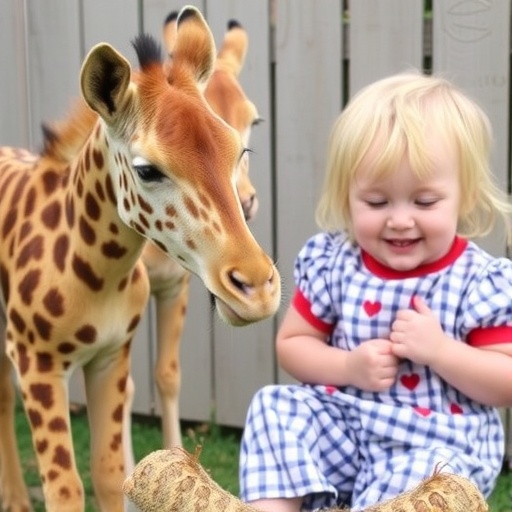In recent years, the connection between children and companion animals has sparked increasing interest among researchers and educators alike. The relationship that preschoolers develop with pets not only influences their emotional and psychological development but also informs their attitudes toward animals in general. This evolving perspective has prompted the need for robust tools to measure these attitudes, leading to the development of the SPACA scale—an instrument that aims to quantify preschoolers’ attitudes towards companion animals. The research conducted by Kypriotaki, Markodimitraki, Linardakis, and colleagues makes significant strides in understanding the nuances of children’s interactions with animals.
The construction of the SPACA scale is a meticulous process that involved defining what constitutes a child’s attitude toward companion animals. This definition encapsulates various dimensions, including emotional responses, beliefs, and behaviors associated with animals. Preschoolers are at a critical stage of development, where their experiences with pets can broadly shape their future attitudes, making it essential to gather accurate data on how they perceive these relationships. The tool developed through this study is designed to assess these perceptions, enabling educators and psychologists to tailor interventions that promote positive interactions between children and animals.
Validation of the SPACA scale was a rigorous process that ensured its reliability and effectiveness. Researchers collected data through direct assessments and feedback from preschool teachers and parents, contributing to a holistic understanding of children’s attitudes. The validation process also included pilot testing with a diverse group of preschoolers to ensure that the scale is culturally sensitive and applicable across different backgrounds. This step is vital, as the researchers sought to create a universally applicable tool that reflects the diverse ways in which children relate to companion animals.
One of the critical findings of the research is the pronounced impact that exposure to companion animals has on preschoolers. The researchers discovered that children with regular interactions with pets often exhibit higher levels of empathy, responsibility, and social skills. These emotional and behavioral outcomes highlight the importance of introducing pets into children’s lives, particularly in formative years. Companion animals not only serve as playmates but also act as catalysts for emotional growth and character development.
In addition to assessing attitudes towards companion animals, the study also explored the implications of these attitudes on children’s overall well-being. The research findings suggest that positive interactions with pets correlate strongly with feelings of joy and security among preschoolers. The safety and warmth provided by a companion animal can foster a nurturing environment that encourages healthy emotional expression. Thus, the research advocates for integrating animals into educational contexts to enhance emotional learning and socialization among young children.
Furthermore, the study discussed the long-term benefits of these early relationships with pets. Children who develop positive attitudes towards animals are more likely to grow into empathetic adults who advocate for animal welfare and environmental sustainability. This suggests that the lessons learned in childhood can have far-reaching effects, shaping societal views toward animals and nature as a whole. By fostering an early love and respect for companion animals, we are essentially nurturing future caretakers and advocates for the natural world.
Teachers and caregivers are pivotal in this developmental phase, and they can play a substantial role in creating environments that promote healthy relationships with animals. The SPACA scale provides valuable insights that can be leveraged for educational purposes, allowing educators to implement strategies that nurture children’s attitudes toward companion animals. Such initiatives can involve classroom pets, nature-based learning activities, or even structured interactions with local animal shelters.
The research also emphasizes the significance of parental involvement in shaping children’s attitudes toward pets. Parents are often the primary influencers in determining whether a child has access to companion animals. By increasing parents’ awareness of the benefits associated with pet ownership, this research encourages dialogue about responsible pet care and the positive behavioral changes that can emerge from these relationships.
Moreover, the SPACA scale offers opportunities for further research in various areas, including animal-assisted therapy and its effects on children’s mental health. Researchers can utilize the findings to investigate how structured interactions with animals can help children cope with anxiety, ADHD, or other developmental challenges. There is a growing body of evidence suggesting that interactions with therapy animals can promote emotional regulation and resilience, paving the way for novel therapeutic approaches in pediatric care.
As the discourse around child development and companionship continues to evolve, the development of the SPACA scale stands as a critical contribution. It not only bridges a gap in the existing literature but also paves the way for future studies focusing on human-animal interactions in educational settings. This innovative tool equips researchers, educators, and mental health professionals with the necessary means to explore this dynamic relationship more deeply.
In conclusion, the study by Kypriotaki and colleagues underscores the importance of understanding preschoolers’ attitudes towards companion animals through a structured measurement scale. The SPACA scale serves as a comprehensive tool that can enhance our understanding of this intricate relationship, offering insights that stress the significance of early emotional development in conjunction with responsible pet ownership. As society advances to recognize the vital role of animals in children’s lives, research like this will help inform practices and policies that promote healthy, compassionate relationships between children and their furry companions.
Subject of Research: Preschoolers’ attitudes towards companion animals.
Article Title: Construction and Validation of a Measurement Scale for Preschoolers’ Attitudes Towards Companion Animals (SPACA).
Article References:
Kypriotaki, M., Markodimitraki, M., Linardakis, M. et al. Construction and Validation of a Measurement Scale for Preschoolers’ Attitudes Towards Companion Animals (SPACA).
IJEC (2025). https://doi.org/10.1007/s13158-025-00456-y
Image Credits: AI Generated
DOI: https://doi.org/10.1007/s13158-025-00456-y
Keywords: preschoolers, companion animals, attitudes, SPACA scale, emotional development.




